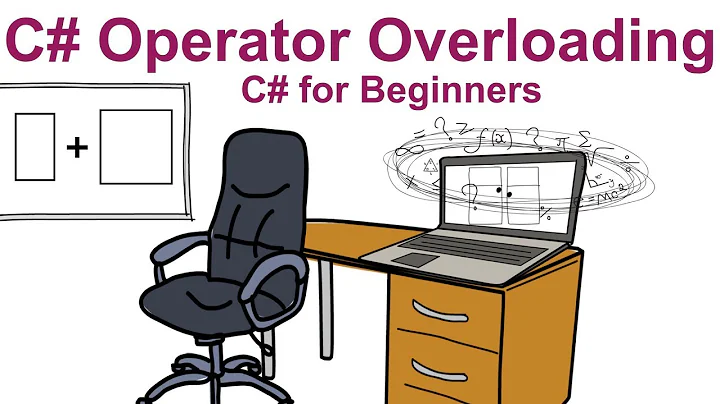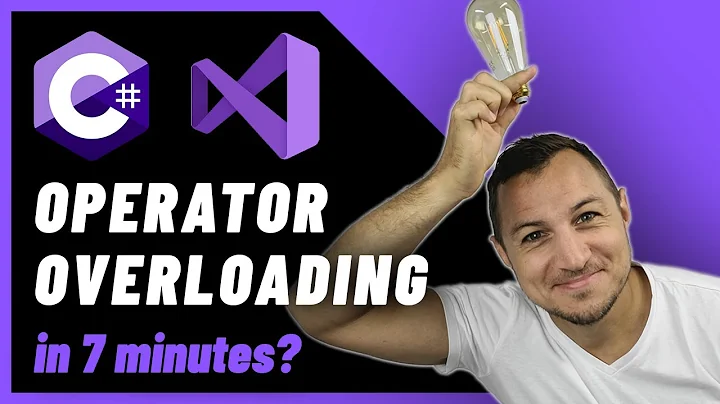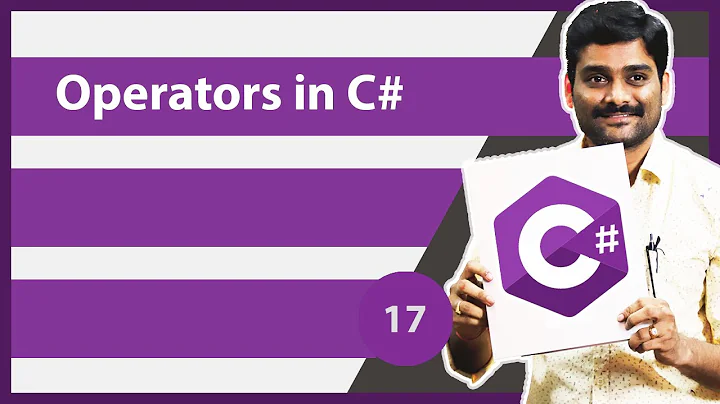Is there an exponent operator in C#?
Solution 1
The C# language doesn't have a power operator. However, the .NET Framework offers the Math.Pow method:
Returns a specified number raised to the specified power.
So your example would look like this:
float Result, Number1, Number2;
Number1 = 2;
Number2 = 2;
Result = Math.Pow(Number1, Number2);
Solution 2
I stumbled on this post looking to use scientific notation in my code, I used
4.95*Math.Pow(10,-10);
But afterwards I found out you can do
4.95E-10;
Just thought I would add this for anyone in a similar situation that I was in.
Solution 3
There is a blog post on MSDN about why an exponent operator does NOT exists from the C# team.
It would be possible to add a power operator to the language, but performing this operation is a fairly rare thing to do in most programs, and it doesn't seem justified to add an operator when calling Math.Pow() is simple.
You asked:
Do I have to write a loop or include another namespace to handle exponential operations? If so, how do I handle exponential operations using non-integers?
Math.Pow supports double parameters so there is no need for you to write your own.
Solution 4
The lack of an exponential operator for C# was a big annoyance for us when looking for a new language to convert our calculation software to from the good ol' vb6.
I'm glad we went with C# but it still annoys me whenever I'm writing a complex equation including exponents. The Math.Pow() method makes equations quite hard to read IMO.
Our solution was to create a special DoubleX class where we override the ^-operator (see below)
This works fairly well as long as you declare at least one of the variables as DoubleX:
DoubleX a = 2;
DoubleX b = 3;
Console.WriteLine($"a = {a}, b = {b}, a^b = {a ^ b}");
or use an explicit converter on standard doubles:
double c = 2;
double d = 3;
Console.WriteLine($"c = {c}, d = {d}, c^d = {c ^ (DoubleX)d}"); // Need explicit converter
One problem with this method though is that the exponent is calculated in the wrong order compared to other operators. This can be avoided by always putting an extra ( ) around the operation which again makes it a bit harder to read the equations:
DoubleX a = 2;
DoubleX b = 3;
Console.WriteLine($"a = {a}, b = {b}, 3+a^b = {3 + a ^ b}"); // Wrong result
Console.WriteLine($"a = {a}, b = {b}, 3+a^b = {3 + (a ^ b)}"); // Correct result
I hope this can be of help to others who uses a lot of complex equations in their code, and maybe someone even has an idea of how to improve this method?!
DoubleX class:
using System;
namespace ExponentialOperator
{
/// <summary>
/// Double class that uses ^ as exponential operator
/// </summary>
public class DoubleX
{
#region ---------------- Fields ----------------
private readonly double _value;
#endregion ------------- Fields ----------------
#region -------------- Properties --------------
public double Value
{
get { return _value; }
}
#endregion ----------- Properties --------------
#region ------------- Constructors -------------
public DoubleX(double value)
{
_value = value;
}
public DoubleX(int value)
{
_value = Convert.ToDouble(value);
}
#endregion ---------- Constructors -------------
#region --------------- Methods ----------------
public override string ToString()
{
return _value.ToString();
}
#endregion ------------ Methods ----------------
#region -------------- Operators ---------------
// Change the ^ operator to be used for exponents.
public static DoubleX operator ^(DoubleX value, DoubleX exponent)
{
return Math.Pow(value, exponent);
}
public static DoubleX operator ^(DoubleX value, double exponent)
{
return Math.Pow(value, exponent);
}
public static DoubleX operator ^(double value, DoubleX exponent)
{
return Math.Pow(value, exponent);
}
public static DoubleX operator ^(DoubleX value, int exponent)
{
return Math.Pow(value, exponent);
}
#endregion ----------- Operators ---------------
#region -------------- Converters --------------
// Allow implicit convertion
public static implicit operator DoubleX(double value)
{
return new DoubleX(value);
}
public static implicit operator DoubleX(int value)
{
return new DoubleX(value);
}
public static implicit operator Double(DoubleX value)
{
return value._value;
}
#endregion ----------- Converters --------------
}
}
Solution 5
Since no-one has yet wrote a function to do this with two integers, here's one way:
private static long CalculatePower(int number, int powerOf)
{
long result = number;
for (int i = 2; i <= powerOf; i++)
result *= number;
return result;
}
Alternatively in VB.NET:
Private Function CalculatePower(ByVal number As Integer, ByVal powerOf As Integer) As Long
Dim result As Long = number
For i As Integer = 2 To powerOf
result = result * number
Next
Return result
End Function
CalculatePower(5, 3) ' 125
CalculatePower(8, 4) ' 4096
CalculatePower(6, 2) ' 36
Related videos on Youtube
Charlie
Updated on August 31, 2021Comments
-
Charlie over 2 years
For example, does an operator exist to handle this?
float Result, Number1, Number2; Number1 = 2; Number2 = 2; Result = Number1 (operator) Number2;In the past the
^operator has served as an exponential operator in other languages, but in C# it is a bit-wise operator.Do I have to write a loop or include another namespace to handle exponential operations? If so, how do I handle exponential operations using non-integers?
-
 Ralph Sinsuat almost 14 yearsIt's not in C#, but many languages use
Ralph Sinsuat almost 14 yearsIt's not in C#, but many languages use**as the infix exponentiation operator. -
 mpag over 6 yearscame here because I was miffed that 10 ^ 7 stored in a long/Int64 was giving me "13." I had tried 1E7 also, but that gave me a type error. As I wasn't seeing a type error/illegal operator syntax error, I had assumed my 10^7 was working...
mpag over 6 yearscame here because I was miffed that 10 ^ 7 stored in a long/Int64 was giving me "13." I had tried 1E7 also, but that gave me a type error. As I wasn't seeing a type error/illegal operator syntax error, I had assumed my 10^7 was working... -
 Ian Brockbank almost 4 years@mpag ^ is the exclusive or operator, so 10^7 = 1010b XOR 0111b = 1101b = 13.
Ian Brockbank almost 4 years@mpag ^ is the exclusive or operator, so 10^7 = 1010b XOR 0111b = 1101b = 13. -
A876 almost 3 yearsC, C++, and C# have no exponentiation operator. They use the symbol
^for bitwise exclusive-or, so it seems unwise to overload^as exponentiation (despite BASIC's long tradition). If someone wants to add an exponentiation operator, other choices have merit too. • FORTRAN's**is sensible because exponentiation is "the level after" multiplication (*). • Knuth's↑is sensible because exponentiation is "the level before" tetration (↑↑). (Every possibility has pros and cons (and history).) See en.wikipedia.org/wiki/Exponentiation#In_programming_languages
-
-
jsmars about 10 yearsI understand the argument, but a valid reason would be that Math.Pow() cannot be used to set const values, which makes exponents unusable for all constants.
-
 Nathangrad over 7 yearsCan someone please explain the downvote? I've tested this code and you can too at ideone.com/o9mmAo (C#) & ideone.com/vnaczj (VB.NET) - it appears to work perfectly well.
Nathangrad over 7 yearsCan someone please explain the downvote? I've tested this code and you can too at ideone.com/o9mmAo (C#) & ideone.com/vnaczj (VB.NET) - it appears to work perfectly well. -
Thaina Yu over 7 yearsBecause there are Math.Pow so your code is irrelevance
-
Henry about 7 yearsits not multiplication, its power of.
-
 RubberDuck about 7 yearsYes @Henry and as others have mentioned, an operator doesn't exist. Just
RubberDuck about 7 yearsYes @Henry and as others have mentioned, an operator doesn't exist. JustMath.Pow. I was just offering up an obvious solution to the most common case. -
lamont over 6 yearsMath.Pow() is slow though and this will be substantially faster as long as PowerOf is reasonably small.
-
lamont over 6 yearsAlso much faster than
Math.Pow(Number1, 2) -
 Justas over 6 yearsKeep in mind the performance penalty if using Math.Pow for squaring: stackoverflow.com/questions/936541/…
Justas over 6 yearsKeep in mind the performance penalty if using Math.Pow for squaring: stackoverflow.com/questions/936541/… -
 bytedev over 5 years@Justas I just testing that on .NET Core 2.1 and Math.Pow is now faster than the suggested alternative implementation.
bytedev over 5 years@Justas I just testing that on .NET Core 2.1 and Math.Pow is now faster than the suggested alternative implementation. -
 bytedev over 5 years@Nathangrad Reinventing the (square) wheel is largely considered an anti-pattern. FYI: exceptionnotfound.net/…
bytedev over 5 years@Nathangrad Reinventing the (square) wheel is largely considered an anti-pattern. FYI: exceptionnotfound.net/… -
Alexandre Daubricourt over 5 yearsA power operator would be convenient for operator overloading, to me Math.Pow() does not justify that fact of not creating an exponent operator as Math.Pow() is not an operator an thus has not the same usages as an operator ._.
-
Jesse Chisholm over 4 yearsAlso, thre are faster ways to implement your own power method. See: en.wikipedia.org/wiki/Exponentiation_by_squaring
-
Eakan Gopalakrishnan over 3 yearslearned this the hardway when trying to debug why my calculation didn't work with a ^
-
 z33k over 3 yearsBut you still cannot use it to define constants as they have to be defined at compile-time and
z33k over 3 yearsBut you still cannot use it to define constants as they have to be defined at compile-time andMath.Pow()is used at runtime. -
bkqc about 3 yearsJust keep in my mind that E is always a base-10 exponential. I know if we look closely, we understand this but since the OP was about general exponent, I thought it deserved to be highlighted.
-
bkqc about 3 yearsAs @z33k said, no constants which also means no Enums. This is sad since it makes Flags Enums way more easy to read.
-
bkqc about 3 yearsFor small numbers (like Flags Enums) you can simply use 0 -> 0 | 1 -> 1 << 0 | 2 -> 1 <<1 | 4 -> 1 <<2| ...
-
 Sreenikethan I almost 3 yearsis the VB .NET version really required?? since VB .NET already has the exponent operator...
Sreenikethan I almost 3 yearsis the VB .NET version really required?? since VB .NET already has the exponent operator... -
lamont almost 3 yearsIt is a fairly common thing to want to do when writing Unity games in C# and the time spent doing double precision exponentiation is wasted when all you want is integral powers of integers like 2^X or X^2 or X^3 or something like that. I need it all the time.
-
 Christoph over 2 yearsI don't mind that much when it takes a bit longer, but Math.Pow uses Doubles which are not precise. A simple addition of to integer values converted to doubles can give something like n-1.99999999999742 and then one truncates it back into an integer and gets n-1 instead of n.
Christoph over 2 yearsI don't mind that much when it takes a bit longer, but Math.Pow uses Doubles which are not precise. A simple addition of to integer values converted to doubles can give something like n-1.99999999999742 and then one truncates it back into an integer and gets n-1 instead of n. -
 SendETHToThisAddress over 2 yearsI'm sorry but this is the dumbest thing they ever did for C#. Math.Pow() returns a double, so if you want any other data type then you have to cast it. Using
SendETHToThisAddress over 2 yearsI'm sorry but this is the dumbest thing they ever did for C#. Math.Pow() returns a double, so if you want any other data type then you have to cast it. Using^would have been the obvious solution to anyone who wasn't over-thinking/over-engineering the language.













